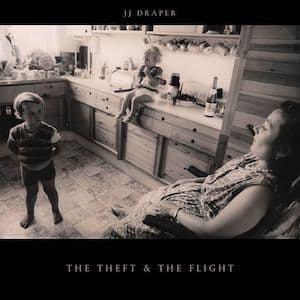
JJ Draper – The Theft and The Flight
Independent – 3 July 2020
Reminiscent of late 2000s indie-folk from the likes of Bon Iver and Sufjan Stevens, JJ Draper’s second EP, The Theft and The Flight is comfortingly familiar, yet fresh and innovative. Blending a variety of obvious and more ambiguous influences together, the record is underpinned throughout by Draper’s personal approach truly coming into his own.
Despite lacking something particularly monumental or remarkable at first listen, a feature so often desperately sought in the making of contemporary music, Draper’s melancholic EP is a stunningly chilled-out, four-track record.
The EP doesn’t strain to be something it’s not, musing personal reflections with a clear passion for music and a grounded approach to lyricism, which in itself makes it a special addition to any music collection. Draper’s new work is an exploration of his rich and intense sonic tapestry, never wallowing and always sincere.
A master of theme-centric and poetic song writing, London-based Draper, has been honing his writing talents since the age of 13. He has always experimented in musical styles, genres and playing techniques, from pre-programming unique tunings on his guitar to becoming a multi-instrumentalist and using the live recording method. The Theft and The Flight was recorded at Natural Habitat Studios to create an authentic homespun sound, free from pretension as Draper takes on the role of composer and co-producer.
Careful, finger-plucked guitar precedes the uplifting, almost hopeful tones of that’s what I call progress! instigating The Theft and The Flight with a more melodically upbeat track. Right from the get-go, the EP’s sound has an incredible depth to it, gently layering a variety of sonics, including a full string section.
Inspired by his own psychedelic experiences and the effect they have had on his life; Draper reflects that he wanted the track to evoke, “awareness of the fragile mortality of the natural world and heart-rendering imaginings of love coming to an end.”
Draper’s ingenuity is evident throughout the track as he combines typical singer-songwriter acoustic guitar and soft vocals with indistinct synth and subtle samples of A Call by Irish poet laureate, Seamus Heaney.
Starkly contrasting any glint of hope expressed in the opening track, …if you’re awake in the night juxtaposes delicately woven sounds with hard-hitting lyrics opining the needless loss of life. Following a murder almost on his doorstep last year, Draper wrote the mournful track to chronicle the real-life tragedies of people who inadvertently wind up ensnared in a cruel and troubling world.
…if you’re awake in the night is where Draper’s gently warbling Bon Iver-esque falsetto becomes prevalent as he conjures emotionally raw soundscapes to address the bleak reality of the world, revealing that the track also muses a secondary theme of the anonymity and often dislocated nature of living in London.
The EP’s penultimate track and lead single, timshel, pays homage to a what Draper describes as particularly poignant section of Steinbeck’s masterpiece East of Eden. The track, allegedly fully formed in a matter of minutes, has not only an overarching theme of the origin of the word ‘timshel’ which addresses the sacredness of human choice, but also depicts the throws of early romance in an incredibly tender and beautiful format.
Despite the album being drenched in stylistic sorrow, timshel uses warm, rhythmically strummed chords which are almost consoling in tone, combined with controlled, softly fluctuating vocals that croon narrative-led lyrics.
the theft and the flight discourses Draper’s creative process, from being struck with an unwanted deluge of inspiration to feeling empty and bereft once the idea has been explored: “I tried to capture that weird feeling of wonderment that what is created didn’t exist before, paired with a feeling of loss that it’s no longer there to be discovered again.”
Sombrely struck guitars build a gloomy, off-kilter resonance as they are met with swooning strings that fill the atmosphere with despair as the opening lines of the EP’s title track commences. Rumbling bass and percussion throughout, along with the presence of otherworldly echoes summoned by the strings section, build the track to its climactic peak mid-song, before rising once again in full force to bring the EP to a resonant end.
